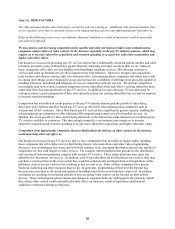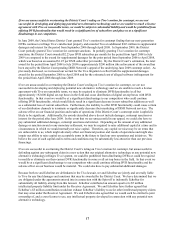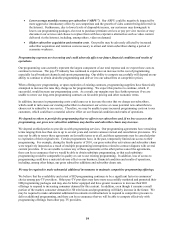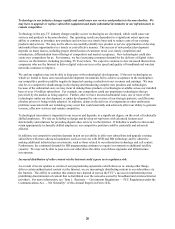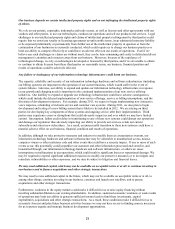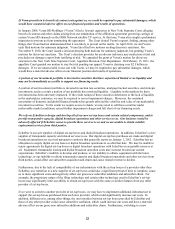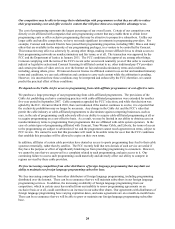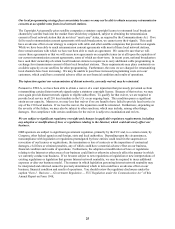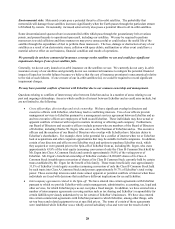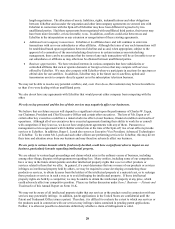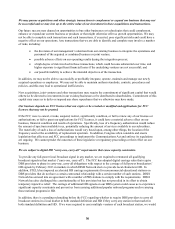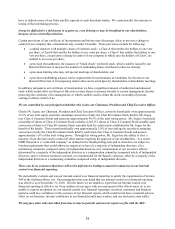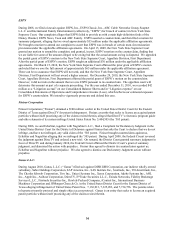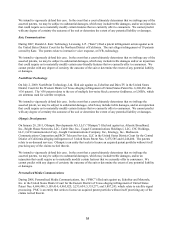Dish Network 2010 Annual Report Download - page 32
Download and view the complete annual report
Please find page 32 of the 2010 Dish Network annual report below. You can navigate through the pages in the report by either clicking on the pages listed below, or by using the keyword search tool below to find specific information within the annual report.25
25
Our local programming strategy faces uncertainty because we may not be able to obtain necessary retransmission
consents at acceptable rates from local network stations.
The Copyright Act generally gives satellite companies a statutory copyright license to retransmit local broadcast
channels by satellite back into the market from which they originated, subject to obtaining the retransmission
consent of local network station that do not elect “must carry” status, as required by the Communications Act. If we
fail to reach retransmission consent agreements with such broadcasters, we cannot carry their signals. This could
have an adverse effect on our strategy to compete with cable and other satellite companies that provide local signals.
While we have been able to reach retransmission consent agreements with most of these local network stations,
there remain stations with which we have not been able to reach an agreement. We cannot be sure that we will
secure these agreements or that we will secure new agreements on acceptable terms (or at all) upon the expiration of
our current retransmission consent agreements, some of which are short-term. In recent years, national broadcasters
have used their ownership of certain local broadcast stations to require us to carry additional cable programming in
exchange for retransmission consent of their local broadcast stations. These requirements may place constraints on
available capacity on our satellites for other programming. Furthermore, the rates we are charged for retransmitting
local channels have been increasing. We may be unable to pass these increased programming costs on to our
customers, which could have a material adverse effect on our financial condition and results of operations.
The injunction against our retransmission of distant networks, currently waived, may be reinstated.
Pursuant to STELA, we have been able to obtain a waiver of a court injunction that previously prevented us from
retransmitting certain distant network signals under a statutory copyright license. Because of that waiver, we may
once again provide distant network signals to eligible subscribers. To qualify for that waiver, we are required to
provide local service in all 210 local markets in the U.S. on an ongoing basis. This condition poses a significant
strain on our capacity. Moreover, we may lose that waiver if we are found to have failed to provide local service in
any of the 210 local markets. If we lose the waiver, the injunction could be reinstated. Furthermore, depending on
the severity of the failure, we may also be subject to other sanctions, which may include, among other things,
damages. Our compliance with certain conditions for the waiver is subject to examination and review.
We are subject to significant regulatory oversight and changes in applicable regulatory requirements, including
any adoption or modification of laws or regulations relating to the Internet, which could adversely affect our
business.
DBS operators are subject to significant government regulation, primarily by the FCC and, to a certain extent, by
Congress, other federal agencies and foreign, state and local authorities. Depending upon the circumstances,
noncompliance with legislation or regulations promulgated by these entities could result in the suspension or
revocation of our licenses or registrations, the termination or loss of contracts or the imposition of contractual
damages, civil fines or criminal penalties, any of which could have a material adverse effect on our business,
financial condition and results of operations. Furthermore, the adoption or modification of laws or regulations
relating to the Internet or other areas of our business could limit or otherwise adversely affect the manner in which
we currently conduct our business. If we become subject to new regulations or legislation or new interpretations of
existing regulations or legislation that govern Internet network neutrality, we may be required to incur additional
expenses or alter our business model. The manner in which legislation governing Internet network neutrality may
be interpreted and enforced cannot be precisely determined, which in turn could have an adverse effect on our
business, financial condition and results of operations. You should review the regulatory disclosures under the
caption “Item 1. Business — Government Regulation — FCC Regulation under the Communication Act” of this
Annual Report on Form 10-K.



